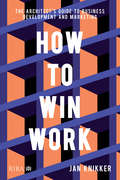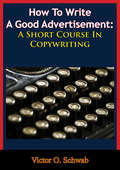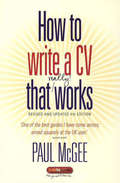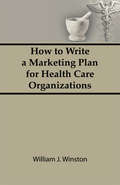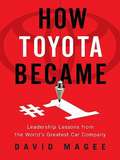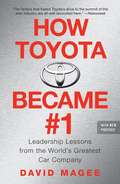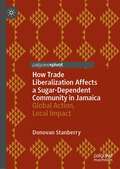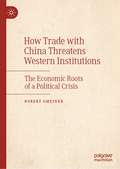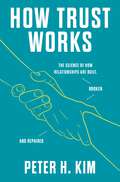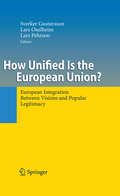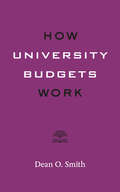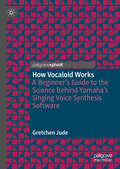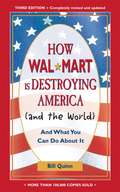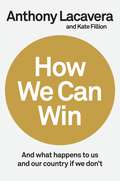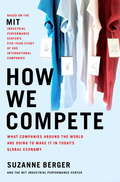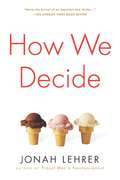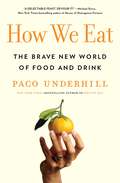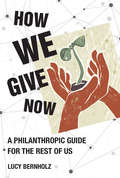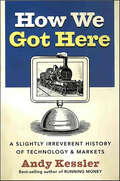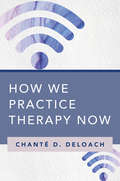- Table View
- List View
How To Win In Commercial Real Estate Investing
by R. Craig CoppolaWhen it comes to investing in commercial real estate, it's easy to make a mistake...so why risk it? Improve your chances of success with a book researched, lived, and written by a master of commercial real estate: Craig Coppola. Craig has navigated the markets, ridden economic ups and downs, and bought and sold countless commercial projects - and he's mastered the world of brokerage, leasing and investing.Readers will learn how to set their own commercial investment goals and create a plan to achieve them, see opportunities with new "real-estate eyes," perform due diligence on a property with minimal cost, use a proven step-by-step process for evaluating properties to weed out losers and showcase winners, and traverse the minefield of letters of intent and contracts.
How To Win Work: The architect's guide to business development and marketing
by Jan KnikkerYou are a great designer, but no-one knows. Now what? This indispensable book, written by one of the most influential marketers in architecture, will demystify Public Relations and marketing for all architects, whether in large practices or practicing as sole practitioners. It bridges the distance between architects and marketing by giving practical tips, best practice and anecdotes from an author with 20 years’ experience in architecture marketing. It explains all aspects of PR and Business Development for architects: for example, how to write a good press release; how to make a fee proposal; how to prepare for a pitch. It gives examples of how others do it well, and the pitfalls to avoid. In addition, it discusses more general aspects which are linked to PR and BD, such as being a good employer, ethics for architects and the challenges when working abroad. Featuring vital insights from a wide variety of architects, from multinational practices to small offices, this book is an essential companion to any architectural office.
How To Work In Someone Else's Country
by Ruth StarkWorking abroad offers adventure, friendship with people of other cultures, intimate familiarity with exciting places, and opportunities to make real differences in communities. It also presents countless challenges, ranging from packing and staying safe and healthy to balancing project objectives with on-the-ground realities, working with local officials, and forging respectful and productive relationships. These challenges and many more are tackled in "How to Work in Someone Else's Country. " Drawing on thirty years of experience as an international consultant in Africa, Asia, Latin America, and the Pacific, Ruth Stark provides guidance for anybody preparing to work in a foreign country. This easy-to-read guide is enlivened by real-life examples drawn from the author's journals and stories shared by colleagues. Slim enough to fit in a carry-on, this book is sure to come in handy wherever your work takes you.
How To Write A Good Advertisement: A Short Course In Copywriting
by Victor O. SchwabGET 44 YEARS OF ADVERTISING WRITING EXPERIENCE IN THE TIME IT TAKES TO READ THIS BOOK!You can learn to write compelling advertisements that will make people notice them, read them, and act upon them. In fact, you can learn to write such powerful advertisements that people actually go out and demand the product advertised and no other. How can you do this? By using the same elements that have made top copywriters like Victor O. Schwab excel at their craft.How to Write a Good Advertisement is a short course in writing powerful, hard-hitting copy that can help you make your products and services irresistible to potential customers. This remarkable book has turned many novice mail order entrepreneurs into expert copywriters and many experienced copywriters into masters of their trade.Whether you are new to the craft or have been writing copy for years, your knowledge and practice of advertising fundamentals will determine the extent of your success. How to Write a Good Advertisement presents these fundamentals from the perspective of a 44-year veteran in the copywriting business. Following these proven techniques and tips, anyone can write professional advertisements that create a memorable image, pull in mailboxes full of orders, or attract new customers to their service.LEARN HOW TO:Grab reader attention immediatelyWrite compelling copy that holds attentionWrite a call to action that's difficult to refuseDesign winning layoutsIncrease the number of ordersConvert more inquiries to ordersGET ANSWERS TO IMPORTANT TECHNICAL QUESTIONS:Effective advertisement length...use of color...smart media placement...and much more.
How To Write a CV That Really Works: A Concise, Clear And Comprehensive Guide To Writing An Effective Cv
by Paul McGeeA guide for those who want to create an effective CV and use it to market themselves. It contains sample CVs and covering letters and interview guidance.
How To Write a CV That Really Works: A Concise, Clear and Comprehensive Guide to Writing an Effective CV
by Paul McGeeA guide for those who want to create an effective CV and use it to market themselves. It contains sample CVs and covering letters and interview guidance.
How To Write a Marketing Plan for Health Care Organizations
by William WinstonA practical guide for developing and writing a strategic marketing plan for health and human service organizations, this comprehensive volume takes professionals through the major steps of the marketing planning process. In addition to a useful overview of the basic marketing components, detailed descriptions of the application of market planning principles to health care organizations are consistently emphasized.
How Toyota Became #1
by David MageeEveryone knows that Toyota has had an amazing twenty-five- year run, rising from a humble Japanese start-up to a thriving global giant. But how did it pass Ford and GM to become the world's largest auto manufacturer? And how does it continue to thrive while so many competitors are struggling and failing?Journalist David Magee dug deeply into Toyota's past and present, interviewing senior executives who rarely talk to the press, along with many other sources. The powerful lessons that he distills, especially about corporate culture, are valuable for managers in all industries.
How Toyota Became #1: Leadership Lessons from the World's Greatest Car Company
by David MageeEveryone knows that Toyota has had an amazing twenty-five-year run, rising from a humble Japanese start-up to a thriving global giant. But how did it pass Ford and GM to become the world's largest auto manufacturer? And how does it continue to thrive while so many competitors are struggling and failing? Journalist David Magee dug deeply into Toyota's past and present, interviewing senior executives who rarely talk to the press, along with many other sources. The powerful lessons that he distills, especially about corporate culture, are valuable for managers in all industries.
How Trade Liberalization Affects a Sugar Dependent Community in Jamaica: Global Action, Local Impact
by Donovan StanberryLocated within the plantation economy model of the “New World Group” of The University of the West Indies, this book explores how the changes in the European Union’s sugar regime impacted a sugar-dependent community in Jamaica. It details how the end of centuries of preferential treatment of Jamaican sugar in the British/European market in 2005 worsened the social and environmental realities of the Monymusk community in Clarendon, Jamaica, which depended on the sugar industry. In describing the response of the Jamaican Government to the changes in the EU Sugar Regime, and the subsequent roll-out of an EU funded adaptation strategy, the author provides some unique perspectives on this process, drawing on his experience as a senior civil servant involved in the process. The book also highlights the continued social and environmental impact on the area since 2015 . The book concludes with a discussion on the empirical findings and how those findings contribute to the debates on the dependency perpetuated by the Plantation Economy Model of development and the failure of neo-liberal influenced government policies, as well as the lack of imagination of post-independent governments to break this dependency and deliver on the promise of independence.
How Trade with China Threatens Western Institutions: The Economic Roots of a Political Crisis
by Robert GmeinerThis book evaluates the institutional environments of China and the United States, and the West more broadly, and how they affect their trading relationship, with specific emphasis on intellectual property theft and other allegations of unfair competition. The economic and political characteristics of the two countries affect the balance of power in their trading relationship, with ramifications far beyond jobs and output. The major theme is China’s ability to free ride on Western institutions through intellectual property theft and extortion. This free riding is far more than just infringing patents and reaping profits; it creates a combination of incentives for political pressures in the West that diminish the free market and liberal Western values. The result is the classic result of free riding – underprovision, or degeneration, of the Western institutions that made the West prosperous and free. At the same time, China’s economic might, military prowess, and global soft power increase, often with deleterious effects for freedom and free markets. This book is distinctive because it integrates public choice ideas about economic institutions, state action, and strategic behavior into international trade. It also takes account of the economic characteristics of China and the West and explains why they present a situation that is fundamentally different from other trade disputes. Institutions and political influence are central to this book’s analysis of trade, which can be more dangerous and more disguised than the welfare gains from trade. Providing a concise and lucid distillation of pressing issues, this book is critical reading for scholars studying trade with China and its effects on both global and Western innovation, economic output, soft power, and freedom more broadly.
How Trust Works: The Science of How Relationships Are Built, Broken, and Repaired
by Dr. Peter H. KimFrom the world's leading expert on trust repair, a guide to understanding the most essential foundation of our relationships and communities.When our trust is broken, and when our own trustworthiness is called into question, many of us are left wondering what to do. We barely know how trust works. How could we possibly repair it?Dr. Peter H. Kim, the world’s leading expert in the rapidly growing field of trust repair, has conducted over two decades of groundbreaking research to answer that question. In How Trust Works, he draws on this research and the work of other social scientists to reveal the surprising truths about how relationships are built, how they are broken, and how they are repaired. Dr. Kim’s work shows how we are often more trusting than we think and how easily our trust in others can be distorted. He illustrates these insights with accounts of some of the most striking and well-known trust violations that have occurred in modern times and unveils the crucial secrets behind when and why our attempts to repair trust are effective, and which breaches of confidence are just too deep.How Trust Works transforms our understanding of our deepest bonds, giving us the tools to build strong and supportive relationships on every level. With our families, coworkers, and friends. With the groups, organizations, and institutions that touch our lives. And even with societies and nations.
How Unified Is the European Union?
by Sverker Gustavsson Lars Pehrson Lars OxelheimThe European project has come a long way in establishing peace, creating a common market, and expanding its borders. At the same time, diminishing popular legitimacy has spurred talk about a European Union in crisis. How far has the EU really come in fulfilling its grand visions? Is the project barely half-way? Or could we say with some confidence that European integration is solidified and will continue to get stronger? This book brings together contributors from economics, political science and law to offer different perspectives on this larger issue. The questions asked include: How far has the European Union come in its creation of a Common Foreign and Security Policy? What will happen to the state monopolies? Is there a common strategy at the European level for integrating immigrants? To what extent do national political parties cooperate with the Europarties? By investigating these and similar issues the book contributes to an assessment of how successful European integration has been to date.
How University Budgets Work (Higher Ed Leadership Essentials)
by Dean O. SmithAn accessible handbook for anyone who needs to understand a university budget—perfect for the non-finance higher ed professional.To understand how universities function, it is critical to understand how their budgets work. In this useful volume, Dean O. Smith provides a concise explanation of university budgets—why they're important, how they are prepared, what information they provide, and how they are monitored.Translating technical jargon into layman's terms, How University Budgets Work emphasizes practical matters and best practices. Writing for a non-specialist audience, Smith covers major aspects of university budgets ranging from their preparation and alignment with strategic plans to their implementation at the departmental level. Offering time-tested advice from his many years in higher administration, he also touches on • expenditure monitoring• projections• allocations• revenue• incentives • financial reserves• end-of-year accounting The companion book to the more rigorous University Finances, also by Smith, How University Budgets Work is a unique introductory guide for the extended academic community. Ultimately, this logical, accessible book provides a working knowledge of how university budgets are produced and implemented, one that enables faculty members and administrators to become more effective in their roles within the university.
How Venture Capital Works
by Hal R. Varian Bob ZiderIn this article, Bob Zider, president of the Beta Group, a California-based firm that invests in commercializing new technologies, presents an analysis of present-day venture capitalists and shows why its practitioners have a lot more in common with investment bankers than you might think. The popular mythology surrounding the U.S. venture-capital industry derives from a previous era. Venture capitalists who nurtured the computer industry in its infancy were legendary both for their risk taking and for their hands-on operating experience. But today things are different, and separating the myths from the realities is crucial to understanding this important piece of the U.S. economy. Today's venture capitalists are more like conservative bankers than the risk takers of days past. They have carved out a specialized niche in the capital markets, filling a void that other institutions cannot serve. They are the linchpins in an efficient system for meeting the needs of institutional investors looking for high returns, of entrepreneurs seeking funding, and of investment bankers looking for companies to sell. Venture capitalists must earn a consistently superior return on investments in inherently risky businesses. The myth is that they do so by investing in good ideas and good plans. In reality, they invest in good industries--that is, industries that are more competitively forgiving than the market as a whole. And they structure their deals in a way that minimizes their risk and maximizes their returns. Although many entrepreneurs expect venture capitalists to provide them with sage guidance as well as capital, that expectation is unrealistic. Given a typical portfolio of 10 companies and a 2,000-hour work year, a venture capital partner spends on average less than 2 hours per week on any given company. In addition to analyzing the current venture-capital system, the author offers practical advice to entrepreneurs thinking about venture funding.
How Venture Capitalists Evaluate Potential Venture Opportunities
by Michael J. Roberts Lauren BarleyFour venture capitalists from leading Silicon Valley firms are interviewed about the frameworks they use to evaluate potential venture opportunities. Questions include: How do you evaluate the venture's prospective business model? What due diligence do you conduct? What is the process through which funding decisions are made? What financial analyses do you perform? What role does risk play in your evaluation? and How do you think about a potential exit route? Russell Siegelman, partner at Kleiner Perkins Caufield & Byers; Sonja Hoel, managing director at Menlo Ventures; Fred Wang, general partner at Trinity Ventures; and Robert Simon, director at Alta Partners, are interviewed.
How Vocaloid Works: A Beginner’s Guide to the Science Behind Yamaha’s Singing Voice Synthesis Software
by Gretchen JudeHow Vocaloid Works explores the technical aspects of Vocaloid, the world&’s most widely known and commercially successful singing voice synthesis software. Unlike previous Anglophone academic works on the subject, this book provides readers with a deeper understanding of the technological foundations of Yamaha&’s concatenative synthesis approach as well as its updated AI synthesis engine. Vocaloid&’s ground-breaking ability to generate a range of both life-like and distinctly artificial timbres continues to demonstrate its lasting impact. However, with the advent of machine learning models capable of both music generation and audio deepfakes, the future of Vocaloid&’s position at the forefront of the industry is uncertain. The book examines into how Vocaloid can create human(oid) vocal sound, covering the fundamentals of acoustic voice production, auditory perception, analog audio, digital signal processing and deep neural networks in order to account for the effectiveness and appeal of synthesized singing voices.
How Walmart Is Destroying America (And the World): And What You Can Do about It
by Bill QuinnAfter carving up the once lovingly cared-for downtowns of Small Town America, Wal-Mart launched a frontal assault on mom-and-pop businesses all over the globe. With 1.5 million employees operating more than 3, 500 stores, Wal-Mart is now the world'¬?s largest private employer. In this third edition of How Wal-Mart Is Destroying America (and the World), intrepid Texas newspaperman Bill Quinn continues the fight. Featuring detailed accounts of Wal-Mart'¬?s questionable business practices and the latest information on Wal-Mart lawsuits, vendor issues, and efforts to stop expansion, Quinn shows why Wal-Mart Stores, Inc., is arguably the most feared and despised corporation in the world. Whether you'¬?re a customer fed up with Wal-Mart'¬?s false claims, a vendor squeezed by strong-arm tactics, a worker pushed to increase the Waltons'¬? bottom line, or a concerned citizen trying to save your hometown, this book will show you how to get Wal-Mart off your back and out of your backyard.BILL QUINN is a World War II veteran, retired newspaperman, and certified anti-Wal-Mart crusader. He lives with his wife, Lennie, in Grand Saline,Texas.From the Trade Paperback edition.
How We Can Win: And What Happens to Us and Our Country If We Don't
by Anthony Lacavera Kate FillionOur kids are smart, our banks are sound, our health care system is humane, our democracy is stable—but technological change is about to disrupt our economy and threaten our way of life. Canadians aren’t ready for the race to the future. Can we still catch up—or even win?Yes, says Anthony Lacavera, one of Canada’s most successful entrepreneurs and venture capitalists. But weneed to change the way we think and talk about our own abilities—dream bigger, aim higher and go for gold, not bronze. We also need to change the way we do business. Our dominant business culture, Lacavera believes, is fundamentally unCanadian: traditional, backward-looking, insular, timid, greedy, unoriginal—everything that Canadians themselves are not. And that unCanadian business culture, protected by outmoded regulations and government policies, is stifling our economic growth. It dumps roadblocks in the path of entrepreneurs who want to build the kind of powerhouse businesses that will create jobs and fuel our economy. Anthony Lacavera faced those roadblocks himself, when he was building WIND—an epic battle against the big three telecommunications giants in Canada. But he’s certain we have the talent and the brains to tear those roadblocks down. He gives us vivid portraits of some of Canada’s most important natural resources: our talented, innovative entrepreneurs, who want to change the world for the better (and, yes, make money while they’re at it). But we are shipping far too many of them to the United States, gift-wrapped in our tax dollars. They don’t want to leave—they’re forced out because it’s just too difficult to build big, bold businesses in Canada. How We Can Win explains what we need to do to keep them here, and what all Canadians must do to ensure our future prosperity. Our biggest problem is not that we are a small country, but that we think too small. We can be a nation of big dreamers and bigger doers. Not by aping Silicon Valley, but by focusing on uniquely Canadian strengths and then doubling down on them. If we bet aggressively on ourselves, and our future, rather than clinging to the status quo, we will create a new, more solid economic foundation—one that allows us to win the race to the future without leaving home.
How We Compete
by Suzanne Berger the MIT Industrial Performance CenterOver the past three years, Americans have come to fear that no job in the United States is safe. Which--if any--will remain in this country? If America loses its manufacturing base, can research, design, and services be far behind?
How We Decide
by Jonah LehrerThe first book to use the unexpected discoveries of neuroscience to help us make the best decisionsSince Plato, philosophers have described the decision-making process as either rational or emotional: we carefully deliberate, or we "blink" and go with our gut. But as scientists break open the mind's black box with the latest tools of neuroscience, they're discovering that this is not how the mind works. Our best decisions are a finely tuned blend of both feeling and reason--and the precise mix depends on the situation. When buying a house, for example, it's best to let our unconscious mull over the many variables. But when we're picking a stock, intuition often leads us astray. The trick is to determine when to use the different parts of the brain, and to do this, we need to think harder (and smarter) about how we think.Jonah Lehrer arms us with the tools we need, drawing on cutting-edge research as well as the real-world experiences of a wide range of "deciders"--from airplane pilots and hedge fund investors to serial killers and poker players.Lehrer shows how people are taking advantage of the new science to make better television shows, win more football games, and improve military intelligence. His goal is to answer two questions that are of interest to just about anyone, from CEOs to firefighters: How does the human mind make decisions? And how can we make those decisions better?
How We Eat: The Brave New World of Food and Drink
by Paco UnderhillAn &“eye-opening&” (Kirkus Reviews) and timely exploration of how our food—from where it&’s grown to how we buy it—is in the midst of a transformation, showing how this is our chance to do better, for us, for our children, and for our planet, from a global expert on consumer behavior and bestselling author of Why We Buy.Our food system is undergoing a total transformation that impacts how we produce, get, and consume our food. Market researcher and bestselling author Paco Underhill—hailed by the San Francisco Chronicle as &“a Sherlock Holmes for retailers&”—reveals where our eating and drinking lives are heading in his &“delectable&” (Michael Gross, New York Times bestselling author of 740 Park) book, How We Eat. In this upbeat, hopeful, and witty approach, How We Eat reveals the future of food in surprising ways. Go to the heart of New York City where a popular farmer&’s market signifies how the city is getting country-fied, or to cool Brooklyn neighborhoods with rooftop farms. Explore the dreaded supermarket parking lot as the hub of innovation for grocery stores&’ futures, where they can grow their own food and host community events. Learn how marijuana farmers, who have been using artificial light to grow a crop for years, have developed a playbook so mainstream merchants like Walmart and farmers across the world can grow food in an uncertain future. Paco Underhill is the expert behind the most prominent brands, consumer habits, and market trends and the author of multiple highly acclaimed books, including Why We Buy. In How We Eat, he shows how food intersects with every major battle we face today, from political and environmental to economic and racial, and invites you to the market to discover more.
How We Give Now: A Philanthropic Guide for the Rest of Us
by Lucy BernholzFrom Go Fund Me to philanthropy: the everyday ways that we can give our money, our time, and even our data to help our communities and seek justice.In How We Give Now, Lucy Bernholz shows that philanthropy is more than writing a check and claiming a tax deduction. For most of us--the non-wealthy givers--philanthropy can be a way of living our values and fully participating in society. We give in all kinds of ways--shopping at certain businesses, canvassing for candidates, donating money, and making conscious choices with our retirement funds. We give our cash, our time, and even our data to make the world a better place. Bernholz takes readers on a tour of the often-overlooked worlds of participatory philanthropy, learning from a diverse group of forty resourceful givers. Donating our digitized personal data is an emerging form of philanthropy, and Bernholz describes safe, equitable, and effective ways of doing so--giving genetic data for medical research through a nonprofit genetics organization rather than a commercial one, for example, or contributing photographs to an online archive like the Densho Digital Repository, which documents America's internment of 120,000 Americans of Japanese descent. Bernholz tells us to "follow the money," however, when we're asked to "add a dollar" to our total at the cash register, or when we buy a charity-branded product; it's more effective to give directly than to give while shopping. Giving is a form of participation. Philanthropy by the rest of us--across geographies and cultural traditions--begins with and builds on active commitment to our communities.
How We Got Here: A Slightly Irreverent History of Technology & Markets
by Andy KesslerBest-selling author Andy Kessler ties up the loose ends from his provocative book, Running Money, with this history of breakthrough technology and the markets that funded them.Expanding on themes first raised in his tour de force, Running Money, Andy Kessler unpacks the entire history of Silicon Valley and Wall Street, from the Industrial Revolution to computers, communications, money, gold and stock markets. These stories cut (by an unscrupulous editor) from the original manuscript were intended as a primer on the ways in which new technologies develop from unprofitable curiosities to essential investments. Indeed, How We Got Here is the book Kessler wishes someone had handed him on his first day as a freshman engineering student at Cornell or on the day he started on Wall Street. This book connects the dots through history to how we got to where we are today.
How We Practice Therapy Now
by Chanté D. DeLoachEssential approaches to clinical practice for today’s out-of-office world. Future psychotherapy is not confined to the office: it can be online, virtual, wellness-oriented, flexible, racially conscious, and in service of public wellness. COVID-19 has forever changed the landscape of psychotherapy in these ways, and in ways we have yet to discover. Practicing psychologist Chanté D. DeLoach invites readers to reflect on the state of psychotherapy and emerging potentialities forged through crisis. She presents key concepts of telemental health, concierge therapy, and other out-of-office approaches to psychological well-being. DeLoach provides step-by-step guidance on getting started in telemental health, and points to clinical, ethical, and legal considerations for clinicians working in a digital space and other nontraditional formations. Topics covered include: how to screen clients for the appropriateness of teletherapy; the required equipment and infrastructure, demystifying the different online platforms; ways to set up a warm and inviting online office, and legal and ethical issues of remote therapy. It also considers business and practice management issues such as what to include in an informed consent for teletherapy. Important discussions of race, intersectionality, and justice in teletherapy round out the book. Readers will be invited to critically reflect on their own identities and comfort in integrating the challenging issues of race, power, and privilege in clinical work. Through interwoven examples and reflective exercises, Dr. DeLoach provides tools to support practitioners as they reimagine their clinical identities to meet the needs of today’s clients. This book offers keen insights and learning for all clinicians, from trainees to seasoned practitioners, who are embarking on this new terrain.

